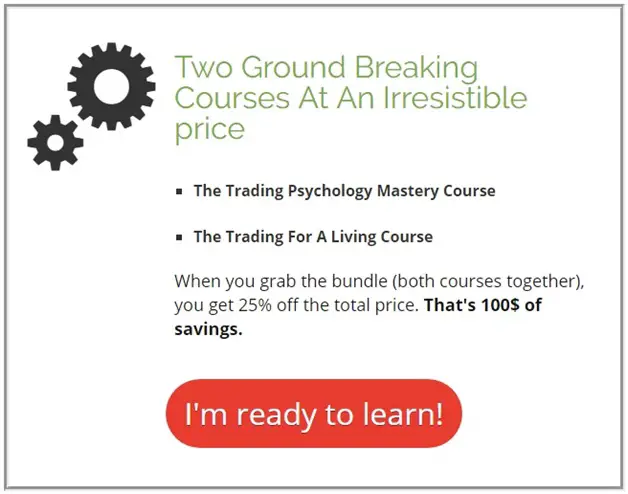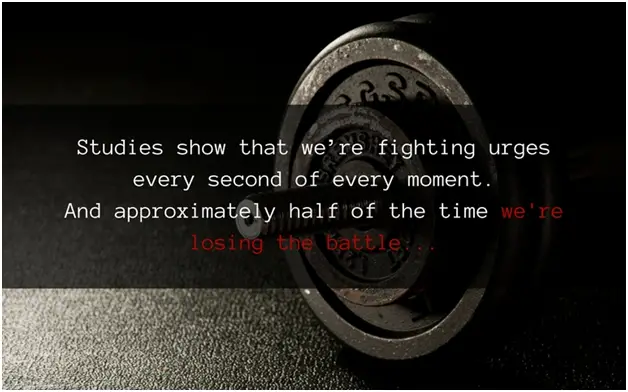This is a Guest Post by Yvan Byeagee. He is one of my personal favorite teachers of trading psychology. His website is at TradingComposure.com.
The Truth About Willpower Revealed *Hint- Alone It Won’t Make You A Profitable Trader
Part of you knows you shouldn’t remove the stop-loss (that’s the more rational part of your mind), but there’s another part urging you to remove it, A.K.A the impulsive part of your mind.
The reason you end up removing the stop-loss is that you’re relying on willpower to save your butt.
But as we’ll see, this doesn’t work so well.
There are all kinds of studies on willpower coming out nowadays. One of them, for instance, shows that we’re fighting urges every second of every moment.
And approximately half of the time we’re losing the battle.
Thoughts flash through our minds very quickly and we’re not even consciously aware of them. But next thing you know, we are clicking and removing that stop-loss, w’re grabbing that bag of Doritos, skipping gym.
Our willpower fluctuates all the time. That’s a fact. Did you get enough sleep? Are you hungry? Are you sad? Sick? All these things, and many others, affect your willpower in ways you can’t even begin to suspect.
Willpower also depletes through use. You might successfully fight the urge to remove a stop-loss, but by the time you have to take another trade, you won’t have the energy to win the next battle against your temptations, whatever that might be.
So, you can’t rely on willpower to do what needs to be done in the markets. It is not a successful strategy no matter how strong of a willpower you have.
You need something else.
Out of sight, out of mind
The first and most energy-efficient way to avoid using willpower is to make your urges impossible to fulfill.
Let me explain.
That bag of Doritos lying on your desk is much harder to resist than a bag of Doritos that is still at the store.
It is easier to fight the urge to remove a stop-loss if you place said stop loss and other contingent orders, turn off your computer, and go do something else.
As the saying goes, out of sight, out of mind.
That’s one.
Shortcuts
Second, think of your mind as a child that constantly needs assistance. And since you’re living with it every day, you need to come up with shortcuts to make things easier for it.
For instance, working out is a no-brainer if the gym is across the street. Similarly, trading becomes easier if your position size is light and your charts uncluttered by indicators.
You get the point: If you work on making things easier for you every day, you’ll improve the quality of your conscious and unconscious decisions, and you’ll have a better time achieving the goals that are important to you.
That’s why setting up easy routines can be a powerful thing that will let you minimize your willpower usage, thus conserving it for later *and more important* decisions.
Awareness
Third (and final), work on becoming aware of your thoughts and feelings that arise as a result of what is perceived through your senses.
What works is becoming aware of them before they trigger the need to stop and get the bag of chips, or, in the case of trading, the need to remove the stop-loss.
It’s been my experience that as long as those kinds of thoughts remain unconscious, they will eventually dictate behavior.
By being aware of those thoughts and feelings (simply being aware), before they gain momentum and capture you completely, you can practice wise discernment, just mindfully witnessing and letting go.
Through repeated practice, unwholesome thoughts can come to rest, and then your behavior can start to change naturally.
And we’re not trying to force ourselves to stop, we’re not using willpower. What we’re doing is just observing, and through observation, we just stop, simply because we are aware and not lost in the thoughts.
Final words
As you become aware of thoughts as they arise, you can begin to let them be as they are so that they naturally relax and fall away. And then you can bring attention to your body so that you can feel and release those bodily sensations that underlie those thoughts.
Self-control, delaying short-term emotional gratification and stifling impulsiveness underlies accomplishment of every sort.
To conclude, through a clear process of minimizing emotions, you can be supported in your capacity to make decisions rationally (for the sake of your longer-term goals) and not impulsively (short-sightedly) so that you can achieve the goals that are important to you, while not relying on willpower alone.
In some sense, self-control, delaying short-term emotional gratification and stifling impulsiveness underlies accomplishment of every sort.
Speaking of that, if you haven’t heard of the Trading Composure Bundle, I think you’re going to like this. It includes two groundbreaking courses where I show you my proven process to minimize emotion, the one I use daily to help me navigate the markets with stability of mind.
Check it out. Make some real changes to your trading.
Any questions? I can be reached here : Trading Composure. Or on Twitter
For more articles by Yvan Byeajee here on TradingComposure.com and you can follow him on twitter @yvanbyeajee.

